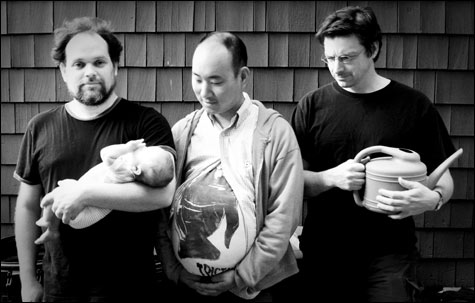
LONG PLAYERS: As Tristan da Cunha, Brian Church (here with son Elias), Ernie Kim, and Steve Budney are Boston's most persistent band — ever. |
Last week, Tristan da Cunha and I brainstormed some strategies by which they might finally hit the big time. Like, getting a charismatic frontman. (David Lee Roth and Bruce Dickinson are seriously discussed in this context.) Or growing long hair. Or becoming Japanese — Japanese bands seem able to get away with anything, even the kind of barbed wire Tristan hide in their cotton candy.
Bassist/lead singer Brian Church, whose Arlington house we're meeting in, had big ideas from the beginning — he wanted to rebel against the introverted math-rock bands of the late '90s and play a more engaging singer role. "I remember seeing this band called Happy Meal playing in some kid's back yard in like 1990. They were the worst band of the day by far, but I still remember them all these years later because of the maniac singer. He ran all over the place screaming about Twinkies, and that's all I remember about that show."
As it happened, Church held onto the bass and the band never found a David Yow clone. But who knows what the real trouble with Tristan is? After nine years of relentlessly weird, almost impossible music and champion-level nice-guyness, Church, drummer Steve Budney, and guitarist Ernie Kim still find themselves operating on a relatively covert exposure level, surrounded by a handful of diehard fans and countless other spectators left scratching their heads.
Their excellent new Irrevolution arrives this week (no label, of course) with a release show Saturday at P.A.'s Lounge. Comprising recordings from studio sessions dating back to 2002 — "Bless the Beasts (Not the Children)" pops up almost every show; "Dub Is the Downfall of Man" is pretty rare — Irrevolution cleans out their vaults, sets up the prospect of an album of brand new material, and gives us a good chance to look back on one of Boston's most persistent bands ever.
Tristan da Cunha are awesome in ways that only hyperbolic rock critics can imagine. They're the first trio ever to meld the skittish guitars of Captain Beefheart's Trout Mask Replica with the drive and alarm of the Dismemberment Plan. Time signatures overlap like tracing paper over fantasy prog paintings of spaceships; notes clang against one another like pots and pans dropped down a flight of cellar stairs. It's like the Ruins with melodies, or U.S. Maple after a pot of strong coffee.
Tristan da Cunha are also the very model of a studied, highly engaged, in-it-to-win-it rock band. They bust out spot-on covers of everything from yacht-rock classics to Dead Kennedys' "Chemical Warfare." Church spent time singing Stravinsky at New England Conservatory; Budney took a trip to London to drum for Radio Stars last year. They make other bands look like fat, musical sloths.
Yet the list of reasons for their consistent obscurity might be as long as the tally of their merits. The music seems show-offy. They dress as if they'd just come from choir rehearsal. The songs are hard to process and harder to retain (not to mention describe). Is the problem that they've made their music difficult to understand?